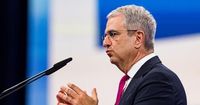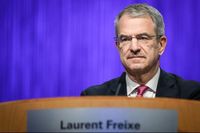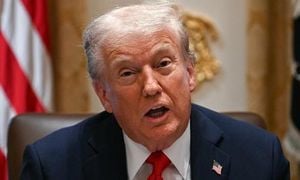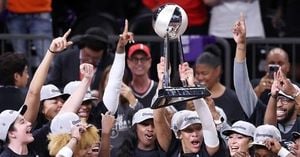In a move that has stunned the business world, Swiss food giant Nestlé has dismissed CEO Laurent Freixe after an internal investigation revealed he had concealed a romantic relationship with a direct subordinate, violating the company’s code of business conduct. The decision, announced on September 2, 2025, marks the second time in just over a year that the world’s largest food company has ousted its chief executive, plunging Nestlé into its deepest leadership crisis in decades and prompting urgent questions about the company’s future direction.
Freixe, who took the helm on September 1, 2024, was let go after a probe overseen by Chairman Paul Bulcke and Lead Independent Director Pablo Isla, with the support of independent outside counsel, confirmed the breach. According to Reuters, the investigation began after staff raised concerns through Nestlé’s internal reporting channel “Speak Up.” Although an initial inquiry found no evidence, persistent staff concerns led to a more thorough investigation, which ultimately substantiated the allegations. Freixe, who initially denied the relationship to the board, was found to have engaged in a romantic relationship with a subordinate he met in 2022, when he was head of Nestlé’s Latin America business, as reported by Inside Paradeplatz.
Nestlé’s code of conduct is clear: direct reporting relationships between family members, partners, or close associates are not allowed, and even indirect reporting lines are scrutinized on a case-by-case basis. While Swiss law does not prohibit such relationships or require disclosure, most large companies—including Nestlé—enforce strict internal rules to prevent conflicts of interest and ensure transparency. Corporate governance expert Peter V Kunz of the University of Bern told Reuters, “In this respect, Mr Freixe’s behaviour – regardless of whether it was legal or not – seems to me to be simply stupid and incomprehensible in this day and age.”
The consequences for Freixe, a 39-year Nestlé veteran, were swift and uncompromising. He will receive no exit package, the company confirmed to Reuters. In a brief statement, Chairman Bulcke thanked Freixe for his years of service but insisted, “This was a necessary decision. Nestlé’s values and governance are strong foundations of our company.” The identity of the female subordinate has not been made public, and a company spokesperson told Reuters that she left Nestlé over the summer.
Freixe’s abrupt departure adds his name to a growing list of high-profile CEOs forced to resign after investigations into workplace relationships. Notably, BP’s former CEO Bernard Looney and McDonald’s CEO Steve Easterbrook were both removed for failing to disclose relationships with colleagues. The incident also comes on the heels of a similar scandal in July involving former Astronomer CEO Andy Byron and Chief People Officer Kristin Cabot, whose public display at a concert sparked a viral debate about workplace ethics and leadership standards.
Philipp Navratil, a 49-year-old rising star who most recently led Nestlé’s Nespresso division, has been appointed as the new CEO. Navratil joined Nestlé in 2001 as an internal auditor, held various roles in Central America, and climbed the ranks to lead the company’s Coffee Strategic Business Unit before taking over Nespresso in 2024. Investors and analysts are watching closely to see if Navratil can steady the ship and deliver the turnaround Nestlé so desperately needs.
The leadership shakeup comes at a precarious time for Nestlé. The company’s shares have lost almost a third of their value over the past five years, underperforming European peers and eroding investor confidence. During Freixe’s short tenure, Nestlé’s shares shed 17% of their value, disappointing shareholders who had hoped for a revival. On September 2, 2025, as news of the dismissal broke, Nestlé shares closed down 0.7% in Zurich, having fallen as much as 3.6% earlier in the day.
The company faces significant headwinds, including the impact of U.S. tariffs, a darkening global economic outlook, rising commodity costs, and the ongoing cost-of-living crisis that is driving consumers toward cheaper alternatives. In July, Nestlé launched a review of its underperforming vitamins business after disappointing first-half sales volumes, signaling that more divestments could be on the horizon. According to the Wall Street Journal, sluggish sales growth and underperformance in segments such as health sciences have only added to the pressure.
Investor frustration is palpable. Ingo Speich, head of Corporate Governance and Sustainability at Deka, a top-30 Nestlé investor, told Reuters, “The loss of two CEOs and a chairman in a year is of historic proportions for Nestlé. The new CEO needs to fix the business model and bring volumes back. He needs to do better M&A and focus more on emerging markets.” Another top-20 Nestlé investor, who spoke to Reuters on condition of anonymity, argued that Navratil’s appointment is “an opportunity for a more ambitious overhaul,” emphasizing the need to slim down the company, cut costs, reduce headcount, and boost organic growth. “The cash flow must cover the dividend. That’s an absolute priority.”
The company’s leadership turmoil is not limited to the CEO’s office. Paul Bulcke, who served as CEO from 2008 to 2016 and has been chairman since 2017, announced in June that he will step down in April 2026. He will be succeeded by Pablo Isla, the former CEO of Spanish fashion retailer Inditex, best known for steering Zara’s global expansion. The upcoming change at the top of Nestlé’s board adds yet another layer of uncertainty as the company seeks to regain its legendary stability. As the Neue Zuercher Zeitung noted, Nestlé has lost its “legendary stability,” a period when CEOs typically served for years before moving up to chairman.
Russ Mould, investment director at AJ Bell, told Reuters, “While Navratil is also an internal appointment, he will want to put his own mark on strategy, and that suggests the clock could be reset when it comes to the turnaround plan.” The company’s next moves will be watched closely by investors, employees, and competitors alike.
Despite the turmoil, some see opportunity in the crisis. As price-sensitive consumers shift to cheaper alternatives and competitors jostle for market share, Nestlé’s new leadership has a chance to reimagine the company’s future. Whether Navratil can deliver the ambitious overhaul that investors demand—and restore Nestlé’s reputation for stability and growth—remains to be seen. For now, the company’s board is betting that a fresh start at the top will help Nestlé navigate its way out of the storm.






